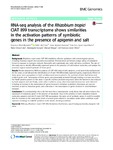Por favor, use este identificador para citar o enlazar este ítem:
http://www.alice.cnptia.embrapa.br/alice/handle/doc/1041600Registro completo de metadatos
| Campo DC | Valor | Lengua/Idioma |
|---|---|---|
| dc.contributor.author | PÉREZ-MONTAÑO, F. | pt_BR |
| dc.contributor.author | CERRO, P. del | pt_BR |
| dc.contributor.author | JIMÉNEZ-GUERRERO, I. | pt_BR |
| dc.contributor.author | LÓPEZ-BAENA, F. J. | pt_BR |
| dc.contributor.author | CUBO, M. T. | pt_BR |
| dc.contributor.author | HUNGRIA, M. | pt_BR |
| dc.contributor.author | MEGÍAS, M. | pt_BR |
| dc.contributor.author | OLLERO, F. J. | pt_BR |
| dc.date.accessioned | 2016-03-22T11:11:11Z | pt_BR |
| dc.date.available | 2016-03-22T11:11:11Z | pt_BR |
| dc.date.created | 2016-03-22 | pt_BR |
| dc.date.issued | 2016 | pt_BR |
| dc.identifier.citation | BMC Genomics, v. 17, n. 1, p. 198, Mar. 2016. | pt_BR |
| dc.identifier.issn | 1471-2164 | pt_BR |
| dc.identifier.uri | http://www.alice.cnptia.embrapa.br/alice/handle/doc/1041600 | pt_BR |
| dc.description | Rhizobium tropici strain CIAT 899 establishes effective symbioses with several legume species, including Phaseolus vulgaris and Leucaena leucocephala. This bacterium synthesizes a large variety of nodulation factors in response to nod-gene inducing flavonoids and, surprisingly, also under salt stress conditions. The aim of this study was to identify differentially expressed genes in the presence of both inducer molecules, and analyze the promoter regions located upstream of these genes. Results obtained by RNA-seq analyses of CIAT 899 induced with apigenin, a nod gene-inducing flavonoid for this strain, or salt allowed the identification of 19 and 790 differentially expressed genes, respectively. Fifteen of these genes were up-regulated in both conditions and were involved in the synthesis of both Nod factors and indole-3-acetic acid. Transcription of these genes was presumably activated through binding of at least one of the five NodD proteins present in this strain to specific nod box promoter sequences when the bacterium was induced by both apigenin and salt. Finally, under saline conditions, many other transcriptional responses were detected, including an increase in the transcription of genes involved in trehalose catabolism, chemotaxis and protein secretion, as well as ribosomal genes, and a decrease in the transcription of genes involved in transmembrane transport. To our knowledge this is the first time that a transcriptomic study shows that salt stress induces the expression of nodulation genes in the absence of flavonoids. Thus, in the presence of both nodulation inducer molecules, apigenin and salt, R. tropici CIAT 899 up-regulated the same set of symbiotic genes. It could be possible that the increases in the transcription levels of several genes related to nodulation under saline conditions could represent a strategy to establish symbiosis under abiotic stressing conditions. | pt_BR |
| dc.language.iso | eng | eng |
| dc.rights | openAccess | eng |
| dc.subject | RNA-seq | pt_BR |
| dc.subject | Nod factors | pt_BR |
| dc.subject | Lipochitooligosaccharides | pt_BR |
| dc.subject | Nodutlation | pt_BR |
| dc.title | RNA-seq analysis of the Rhizobium tropici CIAT 899 Transcripitome shows similarities in the activation patterns of symbiotic genes in the presence of apigenin and salt. | pt_BR |
| dc.type | Artigo de periódico | pt_BR |
| dc.date.updated | 2017-06-19T11:11:11Z | pt_BR |
| dc.subject.thesagro | Nodulação | pt_BR |
| dc.subject.thesagro | Rhizobium | pt_BR |
| dc.subject.nalthesaurus | Rhizobium tropici | pt_BR |
| dc.subject.nalthesaurus | Apigenin | pt_BR |
| dc.subject.nalthesaurus | Salt stress | pt_BR |
| riaa.ainfo.id | 1041600 | pt_BR |
| riaa.ainfo.lastupdate | 2017-06-19 | pt_BR |
| dc.identifier.doi | 10.1186/s12864-016-2543-3 | pt_BR |
| dc.contributor.institution | Francisco Péres-Montaño, Universidade de Sevilla; Pablo del Cerro, Universidade de Sevilia; Irene Jiménez-Guerreiro, Universidade de Sevilla; Francisco Javier López-Baena, Universidade de Sevilla; maria Teresa Cubo, Universidade de Sevilla; MARIANGELA HUNGRIA DA CUNHA, CNPSO; Manuel Megías, Universidade de Sevilla; Francisco Javier Ollero, Uiversidade de Sevilla. | pt_BR |
| Aparece en las colecciones: | Resumo em anais de congresso (CNPSO)  | |
Ficheros en este ítem:
| Fichero | Descripción | Tamaño | Formato | |
|---|---|---|---|---|
| RNAseqanalysisoftherhizobium...pdf | 2,16 MB | Adobe PDF |  Visualizar/Abrir |









